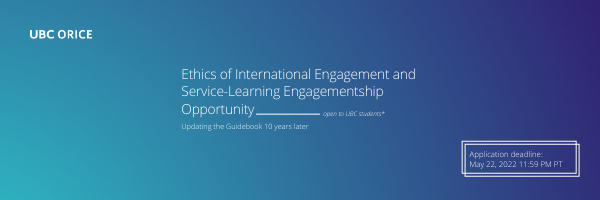Overview:
Over a decade ago, a group of faculty, staff and students began to convene to discuss shared questions and concerns related to international engagement and service learning – particularly as it related to university activities of research, teaching and learning, and public engagement. Why was research being done in particular locations? How was it being done? By who? With who? Why were students motivated to participate in volunteer activities abroad? In global seminars or service-learning courses? How were immersive courses being framed and who was the learning meant to benefit? All of these questions and more led us to ask ourselves, how we could come together to critically think, dialogue and act upon some of these questions. How could we hold ourselves accountable to a strong ethic of engagement? What did we mean by a strong ethic of engagement? And what resources existed to support this critical learning and reflection? This group secured TLEF funding to engage students, staff, faculty and community partners to develop the Ethics of International Engagement and Service-Learning (EIESL) project and its related community of practice.
The community and resources developed through EIESL have been a tremendous resource over the last decade, and now, we would like to engage a new cohort of students, staff, faculty and community to dialogue and develop a 2.0 version that reflects current discourse grounded in the social, political, economic and ecological realities of our day. What does community engagement on global issues mean to you? What is the role of the academic institution on such issues? Has higher education’s role changed? How might we engage the campus community in a renewed conversation?
The first cohort has begun to review and analyze the content of the various EIESL resource, including a preliminary literature review. Identified opportunities and gaps that can give rise to dialogue in the community engagement process.
We are recruiting a second cohort for this project is to build on the work of the first cohort, by continuing to review and analyze content, identify opportunities and gaps, but also advance the work into a dialogue and re-engage the wider UBC community on the overall project. Join us in shaping the next version of this project!
We are looking for collaborators with skills in project design, and a strong interest in ethical participatory community engagement. Successful candidates for this opportunity will demonstrate experience or interest in:
- Undertaking a deep exploration into existing EIESL materials to be able to adopt an asset-based approach to build from existing strengths.
- Assisting with preparations of grant materials to support project revision.
- Collaboratively developing a participatory process to engage the campus and community members into a renewed conversation and set of actions on ethical engagement.
- A commitment to continual learning and engagement with topics of ethics, social justice, anti-racism, and related conversations
Scope:
Over 12 weeks from June to August, a team of 4-5 students will spend 3-5 hours each week exploring the many ways that international (and local) engagement has changed over the years since launching the original EIESL guidebook, and consider how our ethical framework should also adapt to reflect this. Cohort #2 of this project will meet with some of the original faculty, staff, and students involved in EIESL 1.0 to learn more about the original motivations and process for the project. Many original members will remain involved as teammates or mentors on the project. Cohort #2 will continue where cohort #1 left off, they will review and content analysis of the various EIESL resources and do a literature review to identify opportunities and gaps in existing frameworks. Following this familiarization process, cohort #2 will consider how to renew participation on this topic and identify initial areas/topics to prompt dialogue. Cohort #2 will take place from June-August 2022. This is expected to be a multi-stage project (approx. 2.5 years in duration) and will be coordinated through UBC ORICE (one of the original contributors to EIESL).
Deliverables & Milestones:
- Students will meet with a selection of original team members to further explore the intentions of the first project, how it shaped their academic and professional trajectories, and how they know the guide and supplemental resources to have been used over the years.
- Students will conduct a review of existing resources, and continue to identify potential opportunities and gaps that can serve as dialogue prompts in the campus/community engagement process.
- Students will conduct a literature review on ethics of engagement to supplement the review of opportunities and gaps identified in the resource review.
- Students will support the development of a participatory plan for re-engaging the wider UBC community on the overall project.
- Students will be asked to provide a transitional report with a summary of the activities they have undertaken throughout the engagementship and recommendations for subsequent cohorts.
- The students will additionally give a short presentation to the team at ORICE about their key learnings.
Eligibility
- Be an undergraduate or graduate student (domestic or international) at the University of British Columbia as of May, 2022.
- Have access to a reliable internet connection and computer to collaborate with peers and attend remote meetings; Meetings are likely to be a mix of in person and remote.
- Demonstrate ability to think critically and creatively;
- Demonstrate ability to take initiative and work in a collaborative environment;
- Prior experience engaging with community organizations an asset;
- Experience with participatory project design and public speaking is an asset;
- Prior knowledge about or interest in ethical participatory community engagement is an asset
Academic integration:
Please note this is a not-for-credit unpaid opportunity. If you are interested in making this a student-directed study course, please contact ubc.orice@ubc.ca to discuss the process to explore this option.
How to apply:
Thank you for your interest. The recruitment for this program has now closed.
Please reach out to us at ubc.orice@ubc.ca if you have any questions.
